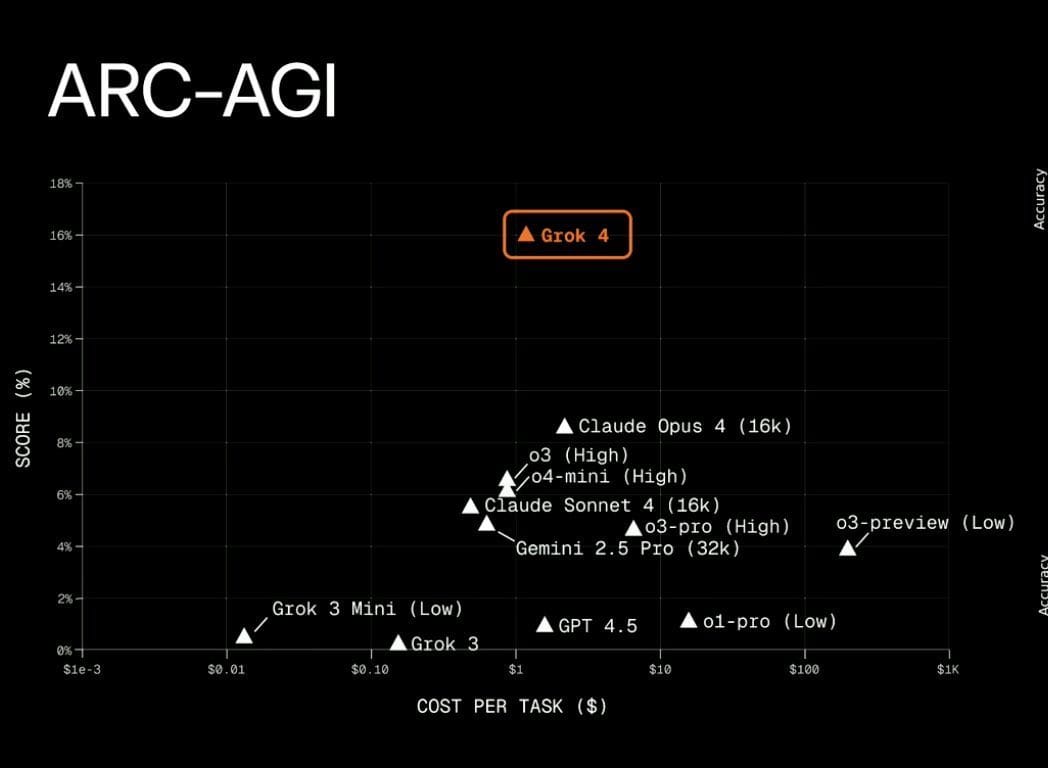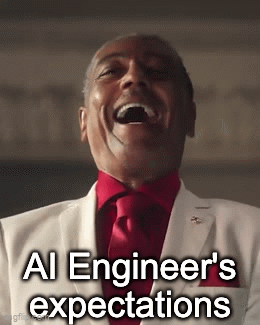- the master
- Posts
- AI Engineer Expectations vs. Reality in 2025
AI Engineer Expectations vs. Reality in 2025
What most learners still get wrong and what companies really want?
Focus on the right skills to become an AI Engineer. Today’s newsletter breaks down what to focus on as an AI Engineer and what to look for in an AI Engineer.
I am starting a new live cohort of AI Engineer HQ BootCamp on 23rd July 2025, 7 PM IST. Register Here.
In today’s edition:
AI Roundup— Grok 4 is here.
Dive Deep Drill— AI Engineer in 2025: Expectations vs. Reality
Build Together— Here’s How I Can Help You
The Elite —Build your second brain for Leading AI Products/Projects.
AI Roundup
Grok 4 is the first time, in my experience, that an AI has been able to solve difficult, real-world engineering questions where the answers cannot be found anywhere on the Internet or in books.
And it will get much better.
— Elon Musk (@elonmusk)
7:39 AM • Jul 10, 2025

Sponsor Spotlight
Learn AI in 5 minutes a day
What’s the secret to staying ahead of the curve in the world of AI? Information. Luckily, you can join 1,000,000+ early adopters reading The Rundown AI — the free newsletter that makes you smarter on AI with just a 5-minute read per day.
Dive Deep Drill
AI Engineer in 2025: Expectations vs. Reality
If you’re learning AI engineering in 2025 or leading teams building AI solutions, it’s time to pause and ask:
Are we focusing on the right things?
There’s a growing gap between what companies need from AI engineers and what most aspiring engineers think they should learn.
Here’s what I’ve seen while training professionals in my AI Engineer HQ bootcamp and working with AI teams through consulting.
Let’s dive deep.
What Most Learners Think They Need

When I talk to people learning AI or reviewing popular learning roadmaps,
I often see:
too much focus on the theory of linear algebra, calculus, and every ML algorithm
not enough focus on deployment and skipping MLOps, CI/CD, or working with APIs
over-focus on research and trying to invent new models instead of building real-world solutions
aim for PhDs, they think they need a PhD to break in, but real-world project experience matters more
In short,
people think AI engineering is research.
But it’s software engineering + machine learning(or DL or GenAI) + business value.
5 Skills Companies Want from AI Engineers
Companies today aren’t just experimenting with AI.
They’re building real products that go live, solve business problems, and serve users.
So what skills are they hiring for?
1) End-to-End Engineering
You have been building models, well, that’s just the start.
Companies want engineers who can deploy models, monitor them, retrain them, and make them work in the real world.
This involves understanding MLOps tools and how to maintain model health in production.
To be more specific with MLOps:
containerization with Docker
CI/CD for Machine Learning (GitHub Actions)
ml Workflow Orchestration (Airflow, Kubeflow, or Vertex AI Pipelines)
monitoring and Observability
infrastructure as code (Terraform)
2) Cloud Experience
Most AI systems run on cloud platforms like AWS, Azure, or GCP.
Knowing services like SageMaker, Vertex AI, or Azure ML is no longer a bonus, it’s expected.
While the hands-on work is mostly API calls or local deployment.
To meet employer expectations, you must be comfortable within a major cloud ecosystem:
managed ML services (AWS SageMaker, Azure ML, Google Vertex AI)
cloud-native data storage and processing (AWS RDS, DynamoDB)
serverless deployment (AWS Lambda or Azure Functions)
Even if I wrote about how AI Certifications are a Waste of Time,
I also added why the only type of certifications with value in the market is cloud certifications.
3) Strong Programming and Data Handling
Python is still the language of choice.
But companies also want engineers who can work with SQL, big data tools (like Spark), and who understand data engineering.
If you are a beginner, you should start with Python [YouTube]
Dropping an AI Engineering Beginner’s Guide on YouTube, stay tuned.
4) Real-World ML
It’s not about knowing 100 algorithms.
It’s about applying the right one, solving the right problem, and shipping something useful.

5) Ethical and Responsible AI
Engineers are being asked to think about bias, fairness, and transparency.
This is now a part of the job, not a side note.
The AI Engineer Role Is Changing
Here’s what’s true in 2025:
AI engineering is not data science, it’s more focused on building and deploying systems
it’s not AI research either, you’re not inventing the next GPT, you’re making sure the current one works in production
it’s deeply applied, you’re solving real problems, with real deadlines, for real customers
What You Should Focus On
If you’re preparing for or hiring AI engineers today, focus on:
Python, Git, APIs, Cloud platforms, and MLOps
Data engineering concepts and working with large datasets
Model evaluation and making sure things work at scale
Ethical AI for bias and explaining decisions
Final Thought
The AI engineer in 2025 is part ML expert, part software builder, and part systems thinker.
They don’t just train models, they own the full pipeline, from data to deployment.
If you’re learning, shift your focus from theory to practice.
If you’re leading, hire people who can ship, not just experiment.
This is the reality of AI engineering today.
And this is exactly what I teach inside AI Engineer HQ for engineers, to ship real projects.
Bridge the gap between learning and real-world impact.
One deployed model at a time.
PS: Join AI Engineer HQ July Cohort Now, early bird access 7 left, 13 out of 20 are taken.
Want to work together? Here’s How I Can Help You
AI Engineering & Consulting (B2B) at Dextar—[Request a Brainstorm]
You are a leader?—Join [The Elite]
Become an AI Engineer in 2025—[AI Engineer HQ]
AI Training for Enterprise Team—[MasterDexter]
Get in front of 5000+ AI leaders & professionals—[Sponsor this Newsletter]
I use BeeHiiv to send this newsletter.
Paper Unfold
A series in which you will get a breakdown of complex research papers into easy-to-understand pointers. If you missed the previous ones:
AI Engineer HQ [Starting 23rd July, 7 PM IST]
New Cohort starting on 23rd July, 7 PM IST, reply to this email for details.
PS: Reply to this email if you want me to write on the topic you are interested in.
Him


Reply